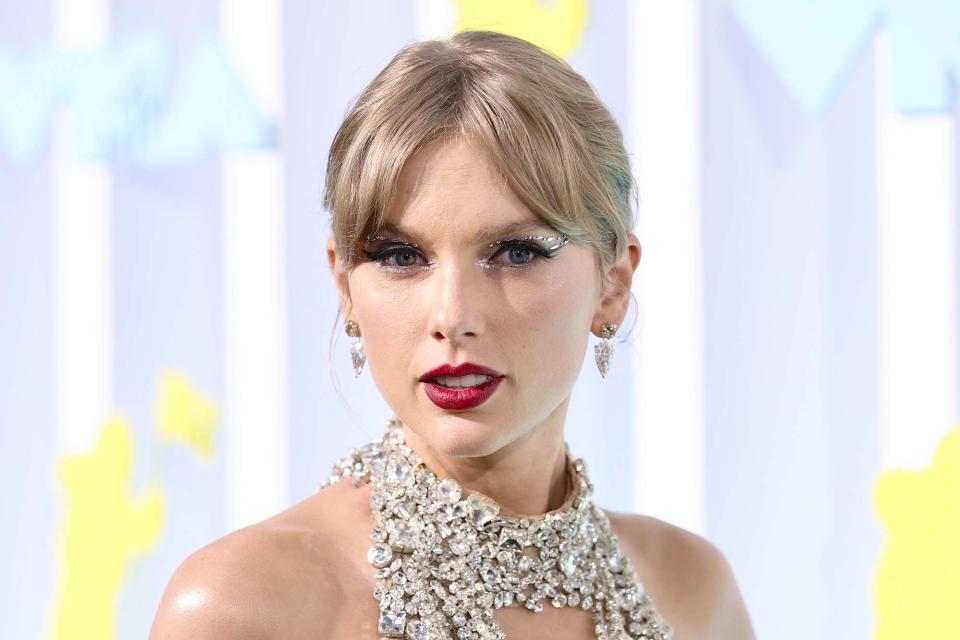Why Taylor Swift's 'Anti-Hero' Music Video Is Getting Backlash
- Oops!Something went wrong.Please try again later.
Here's an explanation of the controversy.

Controversy is swirling around Taylor Swift's new music video for her track "Anti-Hero," which had nearly 33 million views on YouTube by Wednesday morning.
The song "Anti-Hero" focuses on some of Swift's inner demons. When she released the video earlier this week, Swift announced it on her Instagram with some context, noting the audience would watch her "nightmare scenarios and intrusive thoughts" play out. However, some are calling out the video for being fatphobic.
The video, written and directed by Swift, shows the singer, who has opened up about her struggles with disordered eating in the past, stepping onto a scale in one scene. The camera pans down to her feet, but a number isn't shown. Instead, the word "FAT" appears in all caps on the scale.
Users have been voicing frustration with the scene on social media.
"Taylor Swift's music video, where she looks down at the scale where it says 'fat,' is a shitty way to describe her body image struggles," wrote Shira Rose, an eating disorder therapist and L.C.S.W., according to her bio, in a tweet that currently has more than 42,000 likes. "Fat people don't need to have it reiterated yet again that it's everyone's worst nightmare to look like us."
Rose continued her thoughts in a subsequent tweet in the same thread. "Having an eating disorder doesn't excuse fatphobia. It's not hard to say, 'I'm struggling with my body image today' instead of I'm a fat, disgusting pig."
Twitter user @luciewald chimed in too. "It is possible to appreciate Taylor Swift and Midnights as an artist AND call her out on her blatant fatphobia," she tweeted, noting a person can have an eating disorder and be fatphobic. "Taylor Swift should have done better because even if it is relatable and an 'intrusive thought,' it is damaging and fatphobic."
Other users have clapped back at the criticism, defending Swift's artistic choices.
"If you think Taylor Swift is being fatphobic in her music video, you're dismissing and invalidating every human who has an eating disorder aka a very legitimate mental illness," said @mckaysversion on Twitter.
"Taylor Swift having five seconds of a music video that portrays her struggle with eating disorders by having a scale call her fat is 1) not fatphobic, and 2) the absolute least important thing for fat people to be worrying about. Signed, a fat person," added user @klo1012.
It's important to remember that anyone can be fatphobic, including people in recovery from eating disorders, says Serena Nangia, marketing and communications director of Project Heal, a nonprofit focused on equitable access to eating disorder and mental health treatment. However, those people can simultaneously express their insecurities about their bodies and their insecurities about being fatphobic, she adds.
"In my opinion, [Swift is] acknowledging the fact that she has had fatphobic thoughts," she says. Of note, fatphobia can have two distinct meanings: It can mean a person might be afraid of becoming fat, and it also references the systemic issue perpetuated within society that prioritizes a beauty standard for smaller bodies.
That said, Swift could have depicted her feelings in a less offensive or triggering way. Instead of using the word "fat," the artist could have used a word such as "unworthy" or "unlovable," which relates to how people struggling with eating disorders might feel, suggests Nangia.
"So, using those words instead of fat, I think, would actually be a much more powerful message because it's not just about what you look like," says Nangia. "It's about how you're feeling about yourself in your body," she adds, calling attention to a common disorder known as body dysmorphia, in which someone may see themself as fat even if they are not.
:
While everyone has the right to express what they're feeling, Swift's massive audience and influence come with a certain level of responsibility. "When Taylor Swift, with her influence, expresses [herself] in this way, it is harmful because [the scale image] perpetuates the idea that being fat is wrong, and that being fat is bad," says Nangia. "Even though [Swift is] still struggling [with her own body image issues], she needs to acknowledge the fact that she has potentially hurt a lot of people unintentionally."
Despite varying opinions online, the backlash has caused quite the stir, possibly enough to create change. As Apple Music users may have noticed, the "Anti-Hero" music video available on the platform appears to have since be updated with an edited version of the scale scene in question. If you view the video on Apple Music, Swift still appears to weigh herself on a scale in a bathroom, but the moment the camera pans down to her feet to reveal the word "FAT" has been cut. It still currently appears on the YouTube version though.
If you or someone you know is struggling with an eating disorder, NEDA's toll-free, confidential helpline (800-931-2237) is here to help.
false

